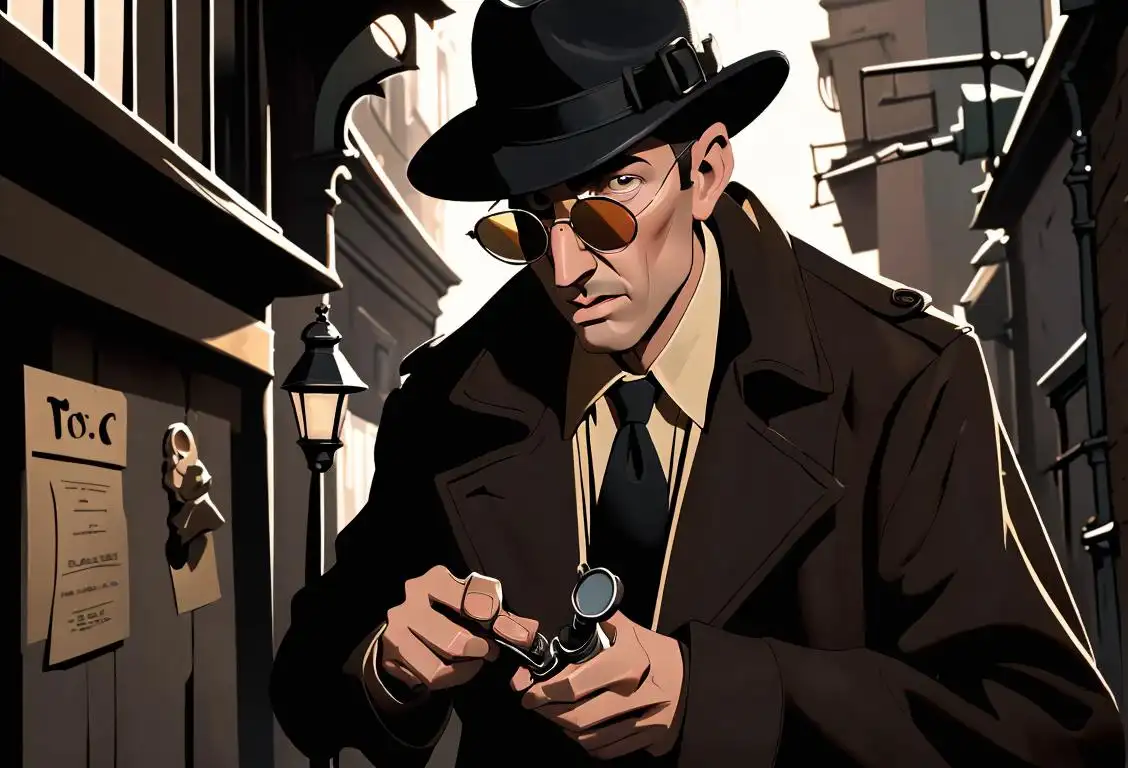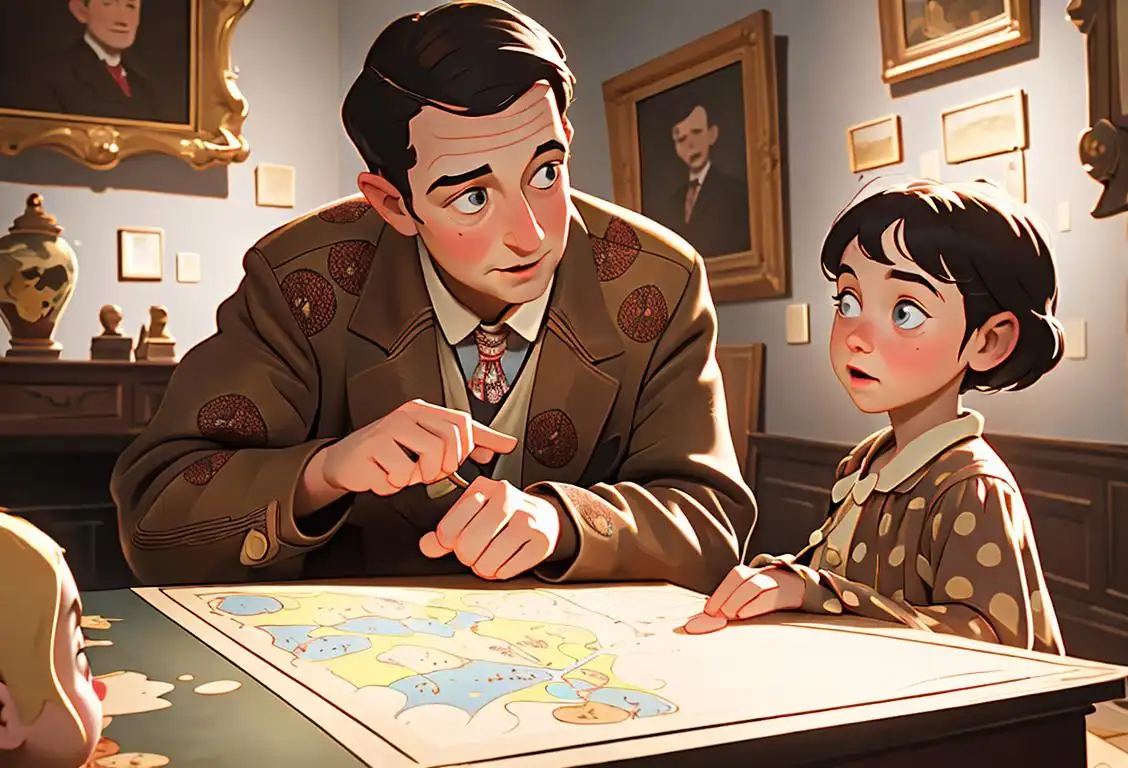National Spy Day

Who hasn’t occasionally wanted to be a super-secret spy, just for a day? Well, strap on your night vision goggles and zip up your stealth suit because it's National Spy Day! An event as elusive as the spies it celebrates, this day has been quietly sneaking up on people online. Its detection on the internet radar peaked on April 10th, 2015, and now, much like its undercover heroes, it’s lurking just out of sight, ready to surprise.
When is Spy Day?
It's national spy day on the 10th April.
A Brief Overview
The digital trail of National Spy Day is as secretive as a spy dossier. Indeed, it appears to have gone to significant lengths to maintain a low profile, achieving its highest online mention count of 25 occurrences in 2015. Over the years, however, the enigma of this day has certainly tickled the imaginations of the masses, who seem to love the idea of indulging their inner James Bond or Harriet the Spy even if only for 24 hours.
The Peak in 2015
Why the spike in mentions in 2015? It remains one of the many mysteries in our classified files. Perhaps it synchronized with a new blockbuster spy movie release or coincided with a monumental moment in espionage history. Or maybe people were just really into secret agent vibes in 2015. Alas, until this information is declassified, we can only speculate and continue to celebrate in hushed whispers.
The Continuity
The discrete whispers of National Spy Day continue to echo online, bolstered by a band of enthusiasts committed to carrying on the clandestine tradition. Whether they're sparked by the thrill of adventure, an undying admiration for fictional spy characters, or simply the idea of a break from normal life, these conversations around National Spy Day show that a true spy never truly 'disappears’.
The Celebration
So, how can you celebrate National Spy Day? Again, much like the trade of the day, the possibilities are endless and limited only by your stealth and style. You could binge-watch a spy movie marathon, bury yourself in a le Carré novel, attempt an escape room challenge or, for the truly imaginative, organize a spy-based scavenger hunt. Remember, it's your mission, should you choose to accept it and as always, should you be caught or killed, the Secretary will disavow any knowledge of your actions.
History behind the term 'Spy'
13th century
Origins of Espionage
The term 'spy' originated in the 13th century, derived from the Old French word 'espier', meaning 'to watch' or 'to observe'. During this time, espionage played an important role in warfare as nations sought to gain advantage over their enemies. Spies were individuals who were trained to gather information, primarily relating to military activities, and report back to their own side. These early spies worked covertly and were often employed by rulers or military commanders.
1898
Origins as a Noun
The term 'spy' originated in 1898 and was derived from the Middle English word 'espyen,' which means to observe or see. Initially, it was primarily used as a noun to describe a person who secretly collects information about the enemy or a rival country.
16th century
The Renaissance and Intelligence Gathering
In the 16th century, during the Renaissance, espionage saw significant advancements. As states grew more organized, the need for reliable intelligence became increasingly vital. This period witnessed the establishment of formal intelligence networks, with individuals dedicated to gathering information on behalf of their governments or rulers. Such networks often involved complex codes and secret communication methods to ensure the security of their activities.
1917
Wartime Influence
During World War I, the term 'spy' gained prominence due to the widespread use of espionage tactics by various countries. Spies played a crucial role in gathering intelligence on enemy activities and strategies. The necessity of covert operations during wartime helped further popularize the term and cement its association with intelligence gathering activities.
19th century
The Birth of Modern Espionage
The 19th century marked the birth of modern espionage, with new advancements in technology and communications. Governments began to establish formal intelligence agencies, such as Britain's MI6, Russia's Okhrana, and Germany's Abwehr. These agencies not only relied on human intelligence but also utilized innovative methods like signal interception, code-breaking, and covert operations.
1929
Espionage in Cinema
The 1929 film 'Blackmail' directed by Alfred Hitchcock featured espionage as a central theme. This marked the beginning of the portrayal of spies in popular culture and greatly influenced the public perception of spies. Movies became a powerful medium for showcasing the daring, secretive, and sometimes glamorous world of espionage, contributing to the romanticization of spies.
1945
The Cold War Era
The Cold War era, spanning from the late 1940s to the early 1990s, saw unprecedented tensions between the United States and the Soviet Union. Spying became a vital aspect of the political landscape during this period, with both superpowers engaging in extensive intelligence operations. Films and novels, such as Ian Fleming's James Bond series, capitalized on this historical context, turning spies into pop culture icons.
20th century
Espionage in the World Wars
The two World Wars of the 20th century brought espionage to the forefront of global conflict. Espionage became a critical tool for gathering information on enemy forces, defense strategies, and technology. Both sides employed skilled spies to infiltrate enemy lines, collect intelligence, and carry out covert operations. The Allies, for example, relied heavily on espionage to deceive Axis powers and gain an advantage during key battles.
21st century
Modern Espionage and Cyber Warfare
In the 21st century, espionage has evolved with the rapid advancement of technology. Traditional methods of intelligence gathering are now complemented by cyber espionage, where highly skilled hackers infiltrate computer networks to gain access to sensitive information. State-sponsored cyber attacks and covert online operations have become increasingly prevalent, posing new challenges for national security agencies worldwide.
1990s
Technological Advancements
With the advent of the digital age, the world of espionage underwent significant transformations. Technological advancements revolutionized intelligence gathering techniques. The internet, encryption, and cyber warfare introduced new challenges for spies. As a result, the term 'spy' expanded to encompass computer hackers and cyber intelligence operatives.
Did you know?
Did you know that April 10 is also the birth date of James 'Whitey' Bulger, a notorious crime boss who was involved in numerous cases of serious crime and was on FBI's Ten Most Wanted Fugitives list for 12 years? Some people think this might have something to do with the peak mention of National Spy Day on the same date!Tagged
Fun Spy Thrill Adventure Mystery FictionFirst identified
10th April 2015Most mentioned on
10th April 2015Total mentions
25Other days
Spy Day
Tourism Day
Dump Annika Day
X Day
Patricia Day
Treasure Day
Head Day
Tattoo Day
Kitten Day
Pabebe Day







